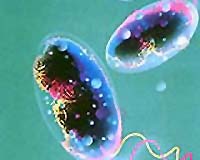 |
Port-Au-Prince (AFP) Oct 30, 2010 Haiti reported seven new deaths Saturday from the cholera outbreak, bringing to 337 the number killed by the diarrheal disease since it first appeared earlier this month. With 4,764 people infected and under medical treatment, the death rate has nevertheless slowed from earlier this week, officials said. Health authorities are battling to contain the disease, fearing it could spread dramatically in the capital Port-au-Prince where 1.3 million people displaced by January's catastrophic earthquake are still living in squalid camps. The source of Haiti's first cholera outbreak in decades remains unclear, although the UN peacekeeping force MINUSTAH is probing claims that its septic tanks leaked into the Artibonite River and contaminated it with fecal bacteria. The outbreak's epicenter is the coastal town of Saint Marc, which is situated at the mouth of the Artibonite, 60 miles (96 kilometers) north of Port-au-Prince.
earlier related report One week after cholera was confirmed in Haiti for the first time in decades, the death rate is slowing, but 305 people have lost their lives and close to 5,000 people have been infected. Officials warn it could be years before it is eradicated. Clinics were operating beyond capacity around the Artibonite River, which is carrying the deadly cholera bacteria across the country to the Caribbean coast at Saint Marc, the outbreak's epicenter some 60 miles (100 kilometers) north of Port-au-Prince. Patients were stretched out on the floor of a radiology department in Saint-Marc, and a five-bed maternity center, ill-equipped to treat the virulent diarrheal disease, housed 300 patients. The source of the outbreak remains unclear, although the UN peacekeeping force MINUSTAH is probing claims its septic tanks leaked into the Artibonite river and contaminated it with fecal bacteria. At the Charles Colimon hospital in Petite Riviere, a small community along the Artibonite, up to 400 patients were packed in every available space -- in the corridors, on floors and in tents surrounding the facility. Residents in this rural town rely heavily on the infected river for their daily chores. The low-lying land is water-logged and irrigation ditches from the river run right past homes where people wash and cook. Men in yellow overalls with canisters of disinfectant strapped to their back sprayed the floor between the hospital beds -- crude wood slabs on short posts with holes cut in the middle and buckets of waste underneath. Patients washed their hands with freshly cut lemons, believing this would help disinfect them. Aid agencies and the Haitian government are urging further steps to prevent the outbreak's spread, with anti-bacterial lotion and tools to prepare food without infected water. Although easily treated, cholera has a short incubation period -- sometimes just a few hours -- and causes acute watery diarrhea that can quickly lead to severe dehydration and death. Oral solutions and packets of rehydration salts were handed out at a local pharmacy to patients suffering from the earlier stages of the disease. "If people are hydrated quick enough, they can be treated easily," said Waking Jean-Baptiste, a doctor liaising between the international medical agency Doctors Without Borders (MSF) and local staff at Charles Colimon. "The problem is we only have one ambulance, for the whole region, so we hear reports that there are many sick people who cannot reach the hospital," he told AFP. "Without treatment, someone can die in as little as eight hours after infection." He said some 25 deaths were reported in Petite Riviere in the first days of the outbreak earlier this month, but there has only been one since MSF arrived. Earlier this week the group's field coordinator for Saint-Marc, Federica Nogarotto, voiced optimism that the epidemic was being controlled. Fewer severe cases suggests "people are taking precautions and that there is a greater understanding in the community of the need to maintain strict hygiene and to seek medical assistance at the first sign of symptoms," she said. But the World Health Organization (WHO) has warned the outbreak is far from over and Haiti should prepare for the disease to hit its capital and the teeming tent cities. WHO cholera chief Claire-Lise Chaignat recommended Haitian authorities prepare for the "worst case scenario" -- cholera in the capital. Some 1.3 million people displaced by the 7.0 magnitude earthquake on January 12 are still packed into thousands of squalid tent camps in Port-au-Prince, and aid agencies warn that cholera could spread like wildfire in such conditions. Fear of the disease is turning to anger here, as Haitians begin to blame foreign aid workers and peacekeepers for the deadly outbreak. The installation of a vital treatment center in Saint-Marc had to be halted on Wednesday after hundreds of residents confronted doctors and aid workers, fueled by fear the facility would spread cholera to two nearby schools.
Share This Article With Planet Earth
Related Links Epidemics on Earth - Bird Flu, HIV/AIDS, Ebola
 Haiti cholera deaths rise above 300
Haiti cholera deaths rise above 300Petite Riviere, Haiti (AFP) Oct 28, 2010 Haiti's cholera toll rose Thursday above 300, as doctors sought to contain an epidemic that is seeing desperate patients overwhelm the quake-hit nation's crumbling hospitals. One week after cholera was confirmed in Haiti for the first time in decades, the death rate is slowing but almost 5,000 people have now been infected and officials warn it could be years before it is eradicated. Cli ... read more |
|
| The content herein, unless otherwise known to be public domain, are Copyright 1995-2010 - SpaceDaily. AFP and UPI Wire Stories are copyright Agence France-Presse and United Press International. ESA Portal Reports are copyright European Space Agency. All NASA sourced material is public domain. Additional copyrights may apply in whole or part to other bona fide parties. Advertising does not imply endorsement,agreement or approval of any opinions, statements or information provided by SpaceDaily on any Web page published or hosted by SpaceDaily. Privacy Statement |